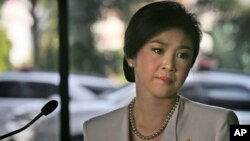BANGKOK —
Thailand’s government is again rebuffing demands from protest leaders that it be dissolved to make way for an appointed council to lead the country.
A day after she moved to dissolve the parliament and call for elections, it became evident that weeks of street protests against her government were taking an emotional toll on prime minister Yingluck Shinawatra.
In brief remarks, she pleaded for understanding that she must remain as caretaker until elections on February 2, despite repeated demands by the opposition for her to immediately depart.
The prime minister said she has backed down to the point where she does not know how to concede any further. She said she also wants to be treated fairly.
As she left the podium, reporters noticed her eyes welling with tears.
Outside the Army Club where she was meeting with members of her cabinet, demonstrators pressed for her removal.
The previous day more than 150,000 people had marched to the main government complex in opposition to what they label an illegitimate regime controlled by Yingluck’s brother - former prime minister Thaksin Shinawatra. He remains in self-imposed exile to avoid prison time for a corruption conviction in Thailand.
While the government makes preparations for elections in less than 60 days, Yingluck's opponents continue to demand that the government instead be replaced by an unelected “people's council.”
As one of the more politically open countries in Southeast Asia, Thailand's political standoff has raised concerns abroad.
The U.S. State Department has issued a statement supporting the democratic process, including elections. Spokesperson Jen Psaki said Washington wants the situation resolved without further violence.
“Our focus here is on continuing to encourage a peaceful resolution of what’s happening on the ground in Thailand and certainly we’ve been watching closely as is evidenced by our statement. But there’s no implication there of any support for any side or anything along those lines,” stated Psaki.
In Beijing, China’s Foreign Ministry spokesman Hong Lei also expressed support for elections.
Hong said that “as a friendly neighbor China hopes the election will be conducted smoothly” and wants to “see that all parties operate within the constitution and the law.”
It remains unclear whether the opposition forces will boycott the election, in which they would be underdogs.
One of the opposition leaders, Suthep Thaugsuban, who resigned from the Democrat Party, has demanded civil servants report to the protest group instead of the government. Suthep, who faces arrest on insurrection charges, has also urged that volunteer neighborhood security forces be established to take over from the police, whom he considers to be corrupt and defenders of the government.
A day after she moved to dissolve the parliament and call for elections, it became evident that weeks of street protests against her government were taking an emotional toll on prime minister Yingluck Shinawatra.
In brief remarks, she pleaded for understanding that she must remain as caretaker until elections on February 2, despite repeated demands by the opposition for her to immediately depart.
The prime minister said she has backed down to the point where she does not know how to concede any further. She said she also wants to be treated fairly.
As she left the podium, reporters noticed her eyes welling with tears.
Outside the Army Club where she was meeting with members of her cabinet, demonstrators pressed for her removal.
The previous day more than 150,000 people had marched to the main government complex in opposition to what they label an illegitimate regime controlled by Yingluck’s brother - former prime minister Thaksin Shinawatra. He remains in self-imposed exile to avoid prison time for a corruption conviction in Thailand.
While the government makes preparations for elections in less than 60 days, Yingluck's opponents continue to demand that the government instead be replaced by an unelected “people's council.”
As one of the more politically open countries in Southeast Asia, Thailand's political standoff has raised concerns abroad.
The U.S. State Department has issued a statement supporting the democratic process, including elections. Spokesperson Jen Psaki said Washington wants the situation resolved without further violence.
“Our focus here is on continuing to encourage a peaceful resolution of what’s happening on the ground in Thailand and certainly we’ve been watching closely as is evidenced by our statement. But there’s no implication there of any support for any side or anything along those lines,” stated Psaki.
In Beijing, China’s Foreign Ministry spokesman Hong Lei also expressed support for elections.
Hong said that “as a friendly neighbor China hopes the election will be conducted smoothly” and wants to “see that all parties operate within the constitution and the law.”
It remains unclear whether the opposition forces will boycott the election, in which they would be underdogs.
One of the opposition leaders, Suthep Thaugsuban, who resigned from the Democrat Party, has demanded civil servants report to the protest group instead of the government. Suthep, who faces arrest on insurrection charges, has also urged that volunteer neighborhood security forces be established to take over from the police, whom he considers to be corrupt and defenders of the government.








